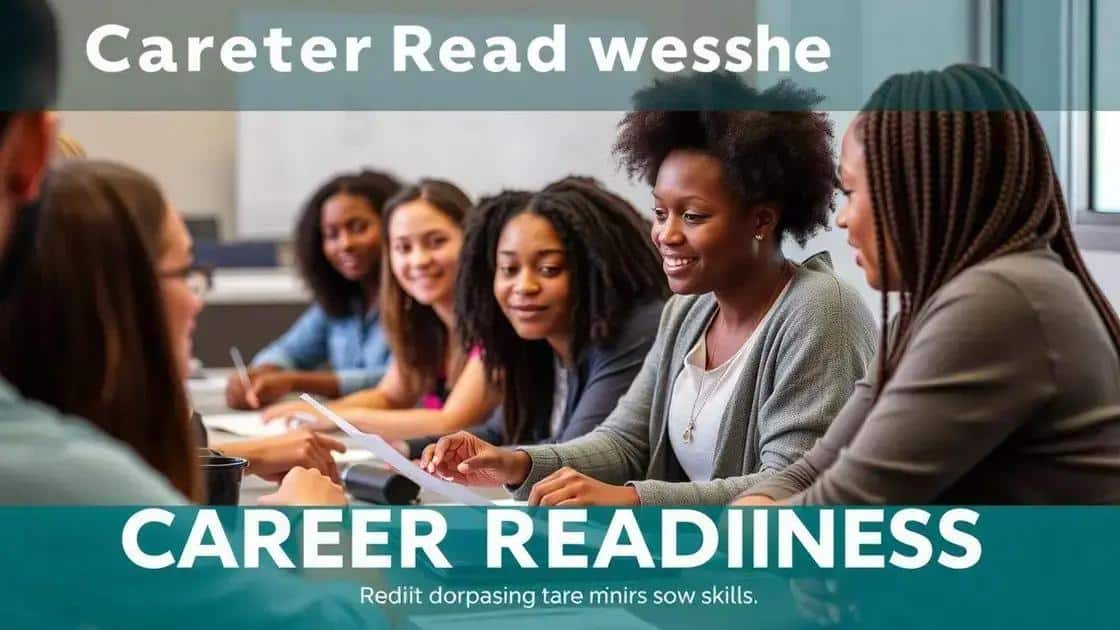Insights on career readiness programs: paving your future

Career readiness programs equip individuals with essential skills and real-world experiences, enhancing job prospects and ensuring a smoother transition into the workforce.
Insights on career readiness programs offer a pathway to navigating today’s competitive job market. Have you ever wondered how these programs can shape your future? Let’s dive into this.
Understanding career readiness programs
Understanding career readiness programs is essential for students and job seekers alike. These programs provide skills and experiences that are crucial for entering the workforce. But what exactly do they entail? Let’s break it down.
What Are Career Readiness Programs?
Career readiness programs are designed to equip participants with the necessary skills to succeed in their future jobs. They typically focus on various aspects such as professional behavior, communication skills, and resume writing.
Key Components of Career Readiness Programs
These programs often include hands-on training and workshops. Here are some key components:
- Workshops on interview techniques and resume building
- Internships or job shadowing opportunities
- Mentorship from industry professionals
- Networking events to connect with employers
Students who participate in these programs often report feeling more prepared for job applications and interviews. They gain valuable insights and practical skills that help them stand out in a competitive job market. Additionally, many programs offer certifications upon completion, providing extra value to participants.
Another crucial part of career readiness programs is the emphasis on soft skills. Skills such as teamwork, problem-solving, and communication are often developed through group projects and interactive sessions. This hands-on approach allows participants to practice these skills in real-world scenarios, which can be incredibly beneficial.
Moreover, career readiness programs are adaptable to various fields. Whether in health care, technology, or business, these programs can tailor their training to suit different industries. This adaptability ensures that participants acquire relevant skills specific to their career interests.
Finally, engaging in a career readiness program can lead to increased confidence and motivation. When individuals see the progress they’re making, they’re more likely to pursue their career goals with enthusiasm.
Key benefits of participating in these programs

Participating in career readiness programs offers various advantages for job seekers. These benefits can profoundly impact one’s professional journey and confidence.
Increased Employment Opportunities
One of the main benefits of these programs is the increase in employment opportunities. Participants gain skills that are in demand, making them more attractive to employers.
- Coaching on how to create an impressive resume
- Mock interviews to prepare for real-life situations
- Exposure to a professional network
- Access to job openings that are often not advertised
Additionally, career readiness programs frequently provide access to internships. Internships are invaluable as they allow individuals to gain hands-on experience in their field of interest. This experience not only enhances a resume but also provides insights into daily job responsibilities and workplace culture.
Another significant aspect of participating in career readiness programs is the development of essential soft skills. Skills such as teamwork, communication, and problem-solving are critical in today’s workplace. Programs often include collaborative projects that foster these skills in practical settings, preparing participants for real-world scenarios.
Personal Growth and Confidence
Beyond technical skills, these programs also focus on personal growth. Participants often report an increase in self-confidence as they complete various challenges and receive constructive feedback.
When individuals learn how to present themselves effectively, they often feel more prepared for interviews and networking events. This newfound confidence can lead to better performance in job applications and interviews, making them stand out from the competition.
Moreover, by meeting and interacting with industry professionals, participants gain insights into potential career paths. This exposure helps them understand what different fields require, allowing for informed decisions about their career futures. Ultimately, the combination of skill development, real-world experience, and personal growth makes participating in career readiness programs an invaluable opportunity for anyone looking to enhance their career prospects.
How to choose the right career readiness program
Choosing the right career readiness program can significantly influence your future job prospects. With so many options available, it’s essential to know what to look for.
Identify Your Goals
Before selecting a program, take some time to identify your goals. Consider what skills you want to develop and what career fields interest you. Understanding your aspirations will help narrow down your choices.
- Think about the industry you want to enter.
- Determine if you need specialized training or soft skills.
- Reflect on your career objectives and timelines.
Setting clear goals allows you to focus on programs that align with your desired outcomes.
Research Program Offerings
Once you have your goals in mind, it’s time to research different programs. Look for information on what each program offers. Some programs might focus heavily on technical skills, while others emphasize soft skills such as communication and teamwork.
When investigating programs, consider these factors:
- Curriculum structure and content
- Mentorship opportunities
- Networking events and job placement assistance
- Certification options
A comprehensive curriculum that covers both technical skills and soft skills can better prepare you for the job market.
It’s also important to check the program’s track record. Look for reviews or testimonials from former participants. Understanding others’ experiences can provide crucial insights into the program’s effectiveness.
Consider Location and Format
Another factor to think about is the location and format of the program. Some may be in-person, while others offer online courses. Decide which format suits your learning style better.
For in-person programs, consider how far you’re willing to commute. For online offerings, ensure that you have a reliable internet connection and a suitable learning environment.
In conclusion, the key to choosing the right career readiness program is to align it with your personal goals, research the offerings thoroughly, and consider the practical aspects of location and learning format. By taking these steps, you can find a program that genuinely supports your journey into the workforce.
Tips for making the most of career readiness opportunities

Making the most of career readiness opportunities can greatly enhance your skills and job prospects. These tips can help you maximize your experience.
Be Proactive
Take the initiative to reach out and explore all the available resources. Whether it’s attending workshops or networking events, being proactive can lead to valuable connections and learning experiences.
- Sign up for all relevant workshops and sessions.
- Ask questions during these events to gain deeper insights.
- Engage with mentors and fellow participants for advice and support.
Approaching opportunities with enthusiasm can open more doors than you might expect.
Set Specific Goals
Before engaging in any program, set specific goals related to what you want to achieve. These goals give you a clear focus and help you track your progress.
- Decide which skills you want to improve.
- Establish what kind of positions you are targeting.
- Outline steps for achieving your desired outcomes.
Having clear objectives can make your experience more rewarding and directed.
Seek Feedback and Learn from Others
Feedback is crucial for growth. Actively seek input from mentors and peers to improve your skills.
Understanding different perspectives can expand your knowledge and help you grow in your career. This way, you can identify areas for improvement and make necessary adjustments.
Stay Engaged and Follow Up
Remaining engaged with the program and your network is essential. Attend follow-up events or reunions to keep the connections alive.
Continuing to build relationships with professionals met during the program can lead to job opportunities and collaborations down the road. Don’t hesitate to reach out for informational interviews or to seek advice on your career path.
FAQ – Questions About Career Readiness Programs
What is a career readiness program?
A career readiness program is designed to equip participants with the skills and experiences needed to succeed in the workforce.
How can I benefit from participating in these programs?
Participating in these programs can improve your job prospects, enhance your skills, and provide networking opportunities with industry professionals.
What should I look for when choosing a program?
Look for programs that align with your career goals, offer a comprehensive curriculum, and provide mentorship and job placement assistance.
How can I make the most of my career readiness opportunities?
Be proactive, set specific goals, seek feedback, and stay engaged with your network to maximize your career readiness experience.





